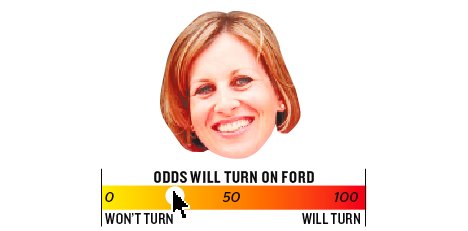
Karen Stintz and John Tory kicked off their respective mayoral campaigns this week by talking about building transit. Neither of them talked about how they would pay for it.
Both contenders filed their papers on Monday, February 24, and both immediately identified the downtown relief subway line as a top priority of their would-be administrations.
In her first scrum as an official candidate, Stintz announced that the initial $3.2 billion phase of the subway could be built without any new “revenue tools” – the taxes, tolls and levies that many see as the only way to raise enough cash for hugely expensive infrastructure projects.
“There are ways we can fund that portion of the downtown relief line without going to people and asking for them to pay more,” she said.
Tory, too, would not endorse transit taxes, at least not yet.
Journalists asked five separate times how he would fund the relief line. “That will all be revealed in due course,” he finally answered.
Stintz’s comments and Tory’s dodges marked a drastic change from what the pair were saying less than a year ago, when the debate about revenue tools hit City Hall. At the time, Metrolinx, the provincial transit agency, was about to release a report recommending a raft of revenue tools to fund a $50 billion expansion of public transportation in the GTA.
The agency asked the city to weigh in, but Mayor Rob Ford, who opposed the revenue tool idea, blocked the issue from going to council.
Stintz excoriated him for not being serious about funding transit. “He talks about wanting to build subways he doesn’t talk about how he is going to pay for them,” she said on April 24.
Tory also took a shot at Ford.
CivicAction, the non-partisan agency Tory chaired at the time, had recently launched a major campaign for more transit investment. In a speech to the Empire Club of Canada, Tory called out politicians who weren’t willing to bite the bullet and support transit taxes.
“If there are two commodities more needed than any others in politics at all levels in 2013, it is honesty and courage. The honesty and courage to tell people there is no free transit,” he said in his prepared remarks.
Now that Stintz and Tory are running for mayor against an incumbent whose political brand is based almost entirely on anti-tax rhetoric, that honesty and courage seem to be in short supply.
In an interview with NOW, Stintz confirms that her new position on revenue tools doesn’t just apply to the relief line. Taxes or fees for any new transit projects will not be part of her campaign.
Her reversal is all the more astounding because she’s holding up the Scarborough subway extension as an example of how her administration would pay for new lines. On Monday she boasted that as TTC chair she secured money from the province and federal government for the project, omitting the inconvenient detail that the city’s contribution is in fact being funded by a revenue tool that she supported: a dedicated 1.6 per cent property tax increase that residents will be paying for 30 years.
Whether Tory will perform a similar flip-flop remains to be seen. It’s entirely possible that the former Ontario PC leader simply didn’t want to launch a controversial proposal on the first day of his campaign and still intends to unveil a platform of new transit taxes in the coming weeks.
But spokesperson Erika Mozes warns that voters shouldn’t expect Tory the candidate to promote the same policies as Tory the CivicAction leader.
“His position as chair of CivicAction and his being candidate for mayor, they’re a little bit different, obviously,” she says.
For the moment, the only substantial comments he’s made since registering suggest he’s adopting the position, used so successfully by Ford in the 2010 election, that billions of dollars’ worth of transit can be built without much impact on taxpayers’ wallets.
“We have to build the transit, but we also have to keep the taxes low,” Tory said Monday.
While conservatives like Tory and Stintz might be expected to get nervous about going to the polls promising to raise taxes, the progressive players in this debate aren’t looking much better.
NDP MP Olivia Chow, who is expected to enter the mayor’s race within weeks, has so far refused to take a position on revenue tools. There’s a chance she will borrow a page from her provincial counterparts, who are outright opposed to the idea.
Ontario NDP leader Andrea Horwath informed Premier Kathleen Wynne last week that she will topple the minority government if the Liberals’ spring budget includes “any new taxes, tools or fees that hit middle-class families,” including transit levies.
Wynne is refusing to back down, meaning her government (and the transit funding scheme) could be defeated in an election called as early as next month.
All this leaves mayoral candidate David Soknacki as a conspicuous advocate of a realistic approach to transit funding.
A conservative former city councillor with only an outside chance of winning, Soknacki prefers a dedicated property tax or development charge increase to pay for new transit.
He says any transit funding scenario that doesn’t include new taxes is a “fantasy,” and argues that all revenue tools “need to be on the table.”
“The alternative is gridlock, right?” he says.
bens@nowtoronto.com | @BenSpurr












